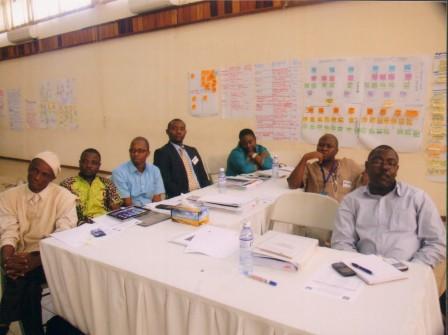EIF/NIU Workshop ends
A four-day workshop organized by the Enhanced Integrated Framework National Implementation Unit EIF/NIU of the Ministry of Trade and Industry ended at the Bank Complex in Kingtom, the workshop started on Tuesday March 11th – Friday March 14th 2014.
EIF/NIU Coordinator, Mr. Abdul Kamara explained that the workshop aims to help capacity participants to design a result oriented project, using a series of practical analysis tools.
Over the course of the four day interactive sessions, participants worked in groups to actually design three “Real” projects concerning commerce and trade, draft result frameworks will be elaborated into full proposals under the coordination of the National Implementation Unit (NIU) of the Enhanced Integrated Framework (EIF) within the Ministry of Trade and Industry, that can be submitted to the EIF, or other donors, for funding.
The workshop is based on the notion that the success of a project is largely determined by the process used to design it. It emphasizes the importance of a participatory approach to project design, with input from a variety of key stakeholders in order to ensure that the project is relevant, feasible and takes into account the country context and local needs.
This tailor-made program was specifically designed for EIF stakeholders. It is the result of a series of pilot workshops conducted by EIF’s Executive Secretariat (ES) and NIUs in Rwanda. Central African Republic and Senegal, in partnership with the Center for International Development and Training (CIDT) of the University of Wolverhampton in the UK.
At the end of the workshop participants feel free about what they have learnt.
Kimberly Ross, said participants will have gotten the opportunity to provide important inputs into the design of the “real” funding proposals, which should help ensure that the project respond to actual needs and are visible and appropriate to the country’s context. Some of the key topics covered include:
- Introduction to the project design and proposal development
- Stakeholders analysis and situation analysis
- The logical framework approach and setting objectives
- Identifying and Managing risks
- Setting indicators and sources of verification
- Developing work plans and budgets
At the end of the workshop participants broke into various groups to tackle the following types of questions:
- Who should be involved and consulted in project design, and how?
- What is the real problem the project is trying to tackle?
- What is the project trying to achieve in the long-term and what will it deliver in the short-term?
- How do we develop a good logical framework?
- How will we know if this project is successful or not?
- How do we plan for problems that might arise in the project lifetime?
- How can we “sell” the project to donors?
The workshop took participants through each step of formulating era projects, using the Logical Framework Approach (LFA). A logical framework or “Log Frame” is a management tool used to improve the design of project and program intervention. It involves identifying strategic elements (inputs, outputs, outcomes and impact) and their casual relationship, indicators and the assumptions and risks that may influence success and failure. It thus facilitates planning execution and evaluation of a development intervention. It is a type of results framework or is sometimes called a Design and monitoring framework.
At the completion of the workshop the following people received certificates:
Chernor Hashim Bangura, Foday Jalloh, A.B. Koroma, Isatu Smith, Josephine Kargbo, Niadroo Anipe, Leanel J. Mocheal, Samuel E. B. Johnson, Sheka Morlai Fornah, Tamba Kamanda, Umaru Ivoody, Beatrice Chaytor, Edward Benya, Idrisa Koroma, Abdul Kamara, Edison Borbor and Grace Macauley.
Stay with Sierra Express Media, for your trusted place in news!
© 2014, https:. All rights reserved.






